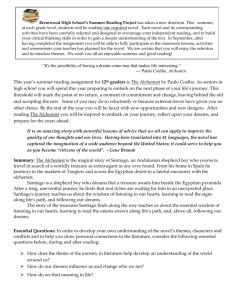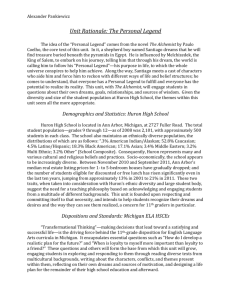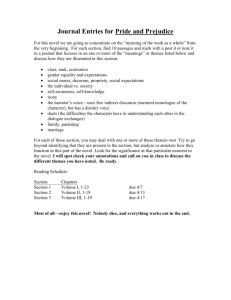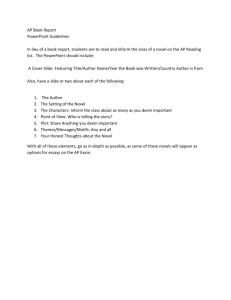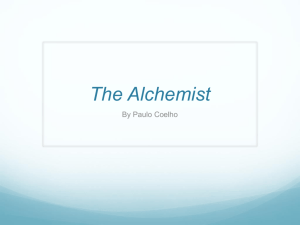The Alchemist: Response Journals
advertisement
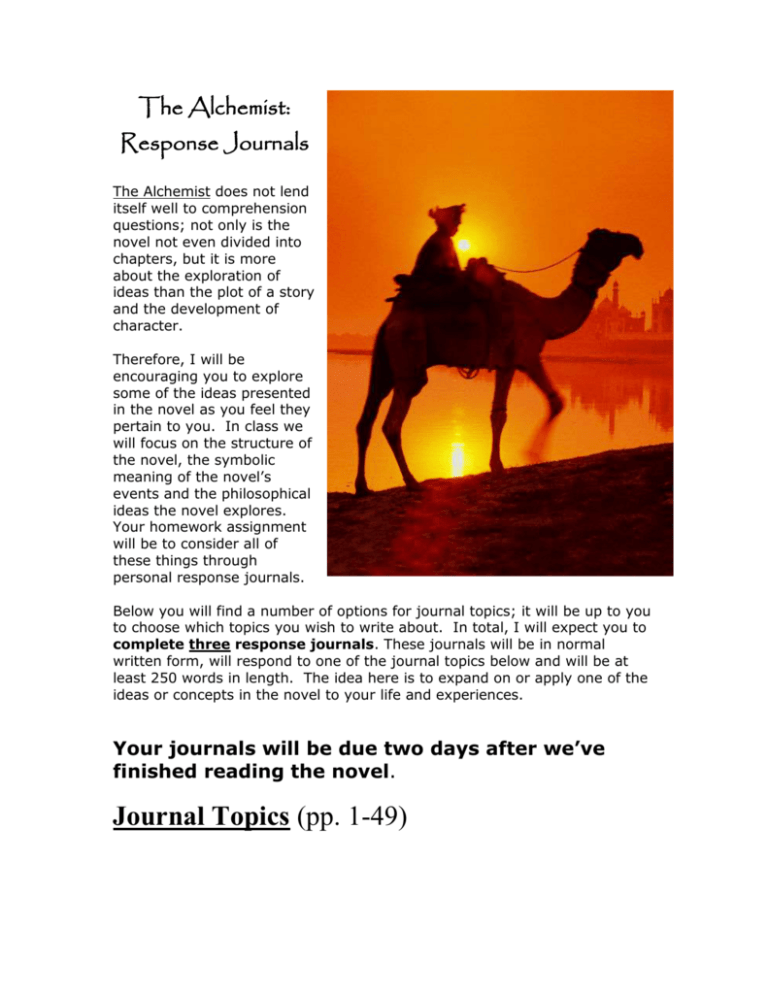
The Alchemist: Response Journals The Alchemist does not lend itself well to comprehension questions; not only is the novel not even divided into chapters, but it is more about the exploration of ideas than the plot of a story and the development of character. Therefore, I will be encouraging you to explore some of the ideas presented in the novel as you feel they pertain to you. In class we will focus on the structure of the novel, the symbolic meaning of the novel’s events and the philosophical ideas the novel explores. Your homework assignment will be to consider all of these things through personal response journals. Below you will find a number of options for journal topics; it will be up to you to choose which topics you wish to write about. In total, I will expect you to complete three response journals. These journals will be in normal written form, will respond to one of the journal topics below and will be at least 250 words in length. The idea here is to expand on or apply one of the ideas or concepts in the novel to your life and experiences. Your journals will be due two days after we’ve finished reading the novel. Journal Topics (pp. 1-49) In your own words, explain the concept of a Personal Legend. What is your Personal Legend? How do you intend to go about realizing it? Are there any “mysterious forces” at work in your life? 1) “It’s the possibility of having a dream come true that makes life interesting” (p. 13). Is this true of your life or the life of someone you know? What happens when we don’t have dreams? Do you know anyone that doesn’t have any dreams? What is that person like? 2) “In the long run, what people think about shepherds and bakers becomes more important for them than their own Personal Legends” (p. 25). What does this mean? Why is this often the case? Has this happened to anyone you know, such as your parents or your grandparents? How do you think you’ll prevent this from happening to you? 3) “The secret of happiness is to see all the marvels of the world, and never to forget the drops of oil on the spoon” (p.34). What are your “drops of oil”? How will you be sure you don’t spill them? 4) The crystal merchant thinks that it’s “too late” to change because he’s been a shopkeeper for thirty years. In Robert Frost’s “The Road Not Taken,” we talked about how “way leads to way” and often you can’t change roads in life. Why not? How do people get “stuck” with the decisions they make? Is there any way to prevent this from happening or is it just an inevitable part of growing up? 5) Journal Topics (pp. 53-85) “…every blessing ignored becomes a curse” (60). Have you ever ignored a blessing? What was it? What happened? 6) The crystal merchant says that part of the reason he hasn’t made his pilgrimage to Mecca is that he’s afraid if his dream is realized, he’ll have no reason to go on living. The other thing he admits to, however, is that he is afraid it won’t live up to his expectations and he’ll be disappointed, in which case he’d prefer to just dream about it. Have you ever gone after something that turned out to be a huge disappointment? Will this experience stop you from pursuing other dreams? 7) “…making a decision was only the beginning of things” (70). Is making a decision merely the beginning or is it more important than that? Does it depend on the decision being made? Provide examples. 8) “If I could, I’d write a huge encyclopedia just about the words luck and coincidence. It’s with those words that the universal language is written” (72). What roles do luck and coincidence play in creating the universal language? What role have they played in your life? 9) 10) “We are afraid of losing what we have, whether it’s our life or our possessions and property. But this fear evaporates when we understand that our life stories and the history of the world were written by the same hand” (78). What do you think this means? How does it apply to Santiago? To your life? Journal Topics (pp. 86-end) “Maybe God created the desert so that man could appreciate the date trees, he thought” (88). What does Santiago mean? Has there ever been a “desert” in your life that helped you appreciate the “date trees”? 11) 12) “Without such love, one’s dreams would have no meaning” (95). Why is this so? Have you experienced this yet? Do you expect to in the future? 13) On page 102, Coelho writes of how the camel driver knows that people find meaning in omens when and how they want to. It’s not the omens themselves that are meaningful, it’s the person’s deepest desires. Have your deepest desires ever spoken to you though an omen? 14) “The secret is here in the present. If you pay attention to the present, you can improve upon it. And if you improve upon the present, what comes later will also be better… Each day, in itself, brings with it an eternity” (104). Do you agree? Can you think of any examples? 15) “You must understand that love never keeps a man from pursuing his Personal Legend. If he abandons that pursuit, it’s because it wasn’t true love…the love that speaks the Language of the World” (122). Do you agree? Are there limitations to this statement? Could you let someone you truly love leave you to seek his or her Personal Legend? What if the search took that person away for several years?





